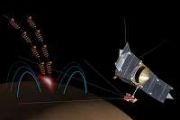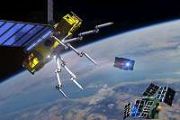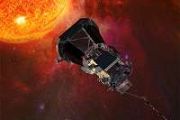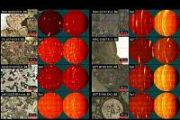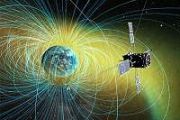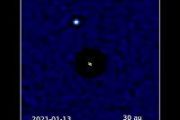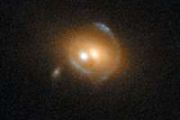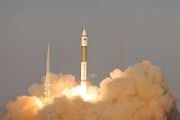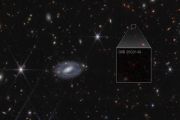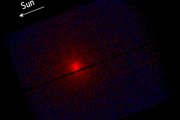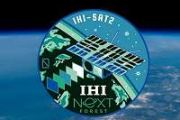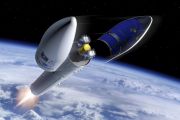
Copernical Team
NASA announces future launch for USU-led space weather mission
 NASA has announced that the launch of the Utah State University Space Dynamics Laboratory and College of Science-led Atmospheric Waves Experiment, or AWE, is scheduled for December 2023. The NASA-funded instrument will launch from Cape Canaveral Space Force Station to the International Space Station.
AWE Principal Investigator Michael Taylor from USU's College of Science leads a team of sc
NASA has announced that the launch of the Utah State University Space Dynamics Laboratory and College of Science-led Atmospheric Waves Experiment, or AWE, is scheduled for December 2023. The NASA-funded instrument will launch from Cape Canaveral Space Force Station to the International Space Station.
AWE Principal Investigator Michael Taylor from USU's College of Science leads a team of sc Rocket Lab launches 34th Electron in second mission from Virginia
 Rocket Lab USA, Inc. (Nasdaq: RKLB) has successfully launched its 34th Electron rocket and second mission from its launch site on Wallops Island, Virginia deploying two spacecraft to low Earth orbit for Capella Space.
The "Stronger Together" mission lifted off at 22:38 UTC, March 16 2023 from Rocket Lab Launch Complex 2 at Virginia Space's Mid-Atlantic Regional Spaceport within NASA's Wall
Rocket Lab USA, Inc. (Nasdaq: RKLB) has successfully launched its 34th Electron rocket and second mission from its launch site on Wallops Island, Virginia deploying two spacecraft to low Earth orbit for Capella Space.
The "Stronger Together" mission lifted off at 22:38 UTC, March 16 2023 from Rocket Lab Launch Complex 2 at Virginia Space's Mid-Atlantic Regional Spaceport within NASA's Wall SpaceX lofts SES-18 and 19 C-Bands birds for US coverage
 SES reports that the SES-18 and SES-19 satellites, designed and assembled by Northrop Grumman, were successfully launched by SpaceX's Falcon 9 rocket from Cape Canaveral Space Force Station in Florida, United States, at 7:38 pm local time on Friday, March 17.
The two American-made satellites are the fourth and fifth - and final - satellites to be launched as part of SES's C-band transition
SES reports that the SES-18 and SES-19 satellites, designed and assembled by Northrop Grumman, were successfully launched by SpaceX's Falcon 9 rocket from Cape Canaveral Space Force Station in Florida, United States, at 7:38 pm local time on Friday, March 17.
The two American-made satellites are the fourth and fifth - and final - satellites to be launched as part of SES's C-band transition Dragonfly Mass Spectrometer could reveal chemistry leading to life on Titan
 A new NASA mission to Saturn's giant moon, Titan, is due to launch in 2027. When it arrives in the mid-2030s, it will begin a journey of discovery that could bring about a new understanding of the development of life in the universe. This mission, called Dragonfly, will carry an instrument called the Dragonfly Mass Spectrometer (DraMS), designed to help scientists hone in on the chemistry at wor
A new NASA mission to Saturn's giant moon, Titan, is due to launch in 2027. When it arrives in the mid-2030s, it will begin a journey of discovery that could bring about a new understanding of the development of life in the universe. This mission, called Dragonfly, will carry an instrument called the Dragonfly Mass Spectrometer (DraMS), designed to help scientists hone in on the chemistry at wor Toodle-oo Tapo Caparo: Sols 3771-3772
 Today, we finally leave Tapo Caparo and begin something new. But... actually, we are not going very far. Whilst sitting at Tapo Caparo, we spent some time looking around at the neighbourhood using Mastcam and ChemCam imaging. Not too far away, we spotted a workspace that includes two types of bedrock - a finely laminated bedrock (which is what we just drilled) and some bedrock with abundant nodu
Today, we finally leave Tapo Caparo and begin something new. But... actually, we are not going very far. Whilst sitting at Tapo Caparo, we spent some time looking around at the neighbourhood using Mastcam and ChemCam imaging. Not too far away, we spotted a workspace that includes two types of bedrock - a finely laminated bedrock (which is what we just drilled) and some bedrock with abundant nodu Rocket Lab to launch twin satellites for BlackSky from New Zealand
 Rocket Lab USA, Inc (Nasdaq: RKLB) will launch a pair of satellites on a dedicated Electron mission for BlackSky (NYSE: BKSY) through global launch services provider Spaceflight, Inc., during a launch window opening March 22, 2023 UTC.
The mission, named "The Beat Goes On," will launch two of BlackSky's Gen-2 Earth-imaging satellites from Pad B at Rocket Lab Launch Complex 1 in Mahia, New
Rocket Lab USA, Inc (Nasdaq: RKLB) will launch a pair of satellites on a dedicated Electron mission for BlackSky (NYSE: BKSY) through global launch services provider Spaceflight, Inc., during a launch window opening March 22, 2023 UTC.
The mission, named "The Beat Goes On," will launch two of BlackSky's Gen-2 Earth-imaging satellites from Pad B at Rocket Lab Launch Complex 1 in Mahia, New Quantum sensing in outer space
 Texas Engineers are leading a multi-university research team that will build technology and tools to improve measurement of important climate factors by observing atoms in outer space.
They will focus on the concept of quantum sensing, which use quantum physics principles to potentially collect more precise data and enable unprecedented science measurements. These sensors could help satell
Texas Engineers are leading a multi-university research team that will build technology and tools to improve measurement of important climate factors by observing atoms in outer space.
They will focus on the concept of quantum sensing, which use quantum physics principles to potentially collect more precise data and enable unprecedented science measurements. These sensors could help satell Study shines new light on ancient microbial dark matter
 Bacteria are literally everywhere - in oceans, in soils, in extreme environments like hot springs, and even alongside and inside other organisms including humans. They're nearly invisible, yet they play a big role in almost every facet of life on Earth.
Despite their abundance, surprisingly little is known about many microorganisms that have existed for billions of years.
This includ
Bacteria are literally everywhere - in oceans, in soils, in extreme environments like hot springs, and even alongside and inside other organisms including humans. They're nearly invisible, yet they play a big role in almost every facet of life on Earth.
Despite their abundance, surprisingly little is known about many microorganisms that have existed for billions of years.
This includ Terminator zones on distant planets could harbor life
 In a new study, University of California, Irvine astronomers describe how extraterrestrial life has the potential to exist on distant exoplanets inside a special area called the "terminator zone," which is a ring on planets that have one side that always faces its star and one side that is always dark.
"These planets have a permanent day side and a permanent night side," said Ana Lobo, a p
In a new study, University of California, Irvine astronomers describe how extraterrestrial life has the potential to exist on distant exoplanets inside a special area called the "terminator zone," which is a ring on planets that have one side that always faces its star and one side that is always dark.
"These planets have a permanent day side and a permanent night side," said Ana Lobo, a p SpaceX sets a new doubleheader record launch for SES
 Establishing a new record of only four hours between a launch of Starlink satellites from Vandenberg Space Force Base, California, earlier today and a pair of geostationary-bound satellites for SES from Cape Canaveral Space Force Station (CCSFS), Florida.
A Luxembourg-based telecommunications company, SES S.A., sent two C-band television broadcasting satellites atop a 229-foot-tall (70-met
Establishing a new record of only four hours between a launch of Starlink satellites from Vandenberg Space Force Base, California, earlier today and a pair of geostationary-bound satellites for SES from Cape Canaveral Space Force Station (CCSFS), Florida.
A Luxembourg-based telecommunications company, SES S.A., sent two C-band television broadcasting satellites atop a 229-foot-tall (70-met 

